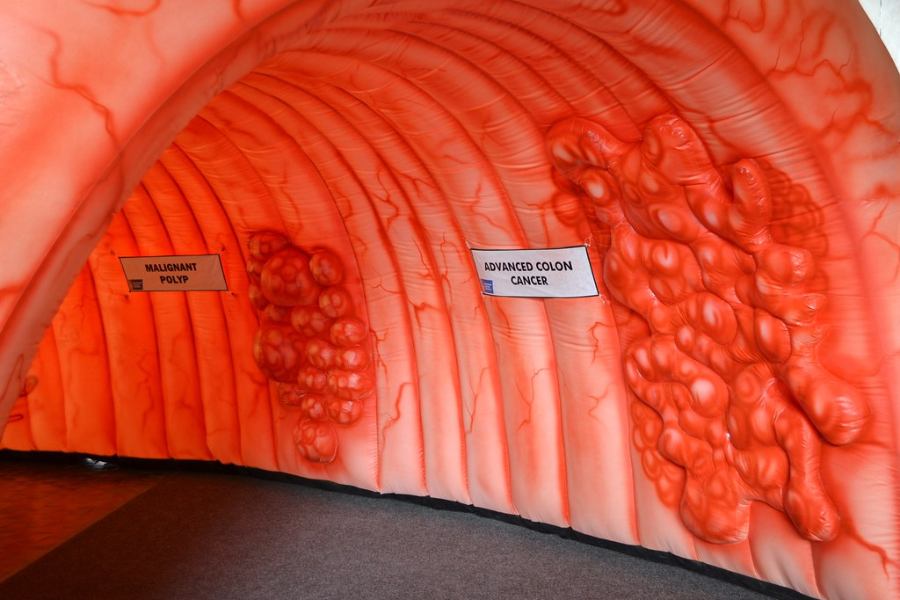Alarming Surge of Colonel Cancer in Young People Raises Concerns in 2024
Posted on : March 14, 2024 By Santo

Colonel cancer, also known as colorectal cancer, is a type of cancer that affects the colon or rectum. It is one of the most common types of cancer worldwide, and its incidence has been on the rise, particularly among young people. In this article, we will explore the causes of colonel cancer and the lifestyle habits that may contribute to its prevalence.
Table of Contents
The Causes of Colon Cancer
While the exact cause of colonel cancer is not fully understood, several factors have been identified as potential contributors to its development. These include:
1. Genetic Factors
Some individuals may have an inherited predisposition to colonel cancer. Certain gene mutations, such as those in the APC, MLH1, and MSH2 genes, have been associated with an increased risk of developing this type of cancer. If you have a family history of colonel cancer, it is important to discuss this with your healthcare provider, as they may recommend genetic testing or screening.
2. Age
As with many types of cancer, the risk of developing colonel cancer increases with age. Most cases are diagnosed in individuals over the age of 50. However, there has been a concerning rise in the number of young people being diagnosed with this disease in recent years, which has led researchers to investigate other potential causes.
3. Lifestyle Habits
Doctors and researchers believe that certain lifestyle habits play a significant role in the increasing prevalence of colonel cancer, especially among young people. These habits include:
- Poor Diet: A diet high in processed foods, red meat, and low in fiber has been linked to an increased risk of colonel cancer. Consuming a diet rich in fruits, vegetables, whole grains, and lean proteins can help reduce this risk.
- Sedentary Lifestyle: Lack of physical activity and prolonged sitting have been associated with a higher risk of colonel cancer. Engaging in regular exercise and avoiding prolonged periods of sitting can help mitigate this risk.
- Smoking and Alcohol Consumption: Both smoking and excessive alcohol consumption have been linked to an increased risk of colonel cancer. Quitting smoking and moderating alcohol intake can significantly reduce this risk.
- Obesity: Being overweight or obese has been identified as a risk factor for colonel cancer. Maintaining a healthy weight through a balanced diet and regular exercise is crucial for reducing the risk of this disease.
Why Is There a Surge in Colonel Cancer Among Young People?
Traditionally, colonel cancer has been considered a disease of older adults. However, there has been a noticeable increase in the number of young people being diagnosed with this type of cancer in recent years. While the exact reasons for this surge are still being studied, several theories have emerged:
1. Changing Diets
The modern Western diet, characterized by high consumption of processed foods, red meat, and low fiber, may be a contributing factor to the rise in colonel cancer cases among young people. Poor dietary choices can lead to inflammation in the colon and rectum, increasing the risk of cancer development.
2. Sedentary Lifestyles
The sedentary nature of many young people’s lives, with increased screen time and decreased physical activity, may also play a role in the increased incidence of colonel cancer. Lack of exercise and prolonged sitting can disrupt normal bowel function and contribute to the development of this disease.
3. Environmental Factors
Exposure to certain environmental factors, such as pollution and chemicals, may also contribute to the surge in colonel cancer cases among young people. Further research is needed to fully understand the impact of these factors on cancer development.
10 Powerful Ways to Slash Your Colorectal Cancer Risk
- Healthy Eating: Consume a diet rich in fruits, vegetables, and whole grains while limiting red meat and processed foods. High-fiber foods can help promote healthy digestion and lower the risk of colorectal cancer.
- Stay Active: Engage in regular physical activity, aiming for at least 30 minutes most days of the week. Exercise helps maintain a healthy weight and reduces the risk of colorectal cancer.
- Moderate Alcohol: Limit alcohol intake, as excessive consumption is linked to a higher risk of colorectal cancer.
- Quit Smoking: If you smoke, quitting can reduce the risk of colorectal cancer, as well as other cancers and health issues.
- Screening: Follow recommended screening guidelines, including colonoscopies starting at age 45 or earlier if there are risk factors or family history. Regular screening detects precancerous polyps or early-stage cancer when treatment is most effective.
- Healthy Weight: Aim to maintain a healthy weight, as obesity and being overweight are associated with a higher risk of colorectal cancer.
- Know Family History: Be aware of family medical history, especially regarding colorectal cancer or related genetic syndromes. Discuss screening options and preventive measures with a healthcare provider if there is a family history.
- Hydration: Drink plenty of water to maintain hydration and promote healthy digestion.
- Consider Aspirin: For some at high risk, low-dose aspirin therapy may be recommended after discussing with a healthcare provider.
- Manage Chronic Conditions: Control conditions like diabetes and inflammatory bowel diseases, as they can increase the risk of colorectal cancer.
By incorporating these measures into your lifestyle, you can help reduce the risk of colorectal cancer and promote overall health.
Conclusion
Colonel cancer, a type of cancer affecting the colon or rectum, has seen a concerning rise in young people. While genetic factors and age play a role in its development, lifestyle habits are believed to be significant contributors. Adopting a healthy diet, engaging in regular physical activity, avoiding smoking and excessive alcohol consumption, and maintaining a healthy weight are essential for reducing the risk of colonel cancer. Awareness and early detection through regular screenings are also crucial in combating this disease.
Share this articlePosted on : March 14, 2024 By Santo
Join Our Club

"Stay Informed, Stay Ahead – Join Our Club Today!"



















